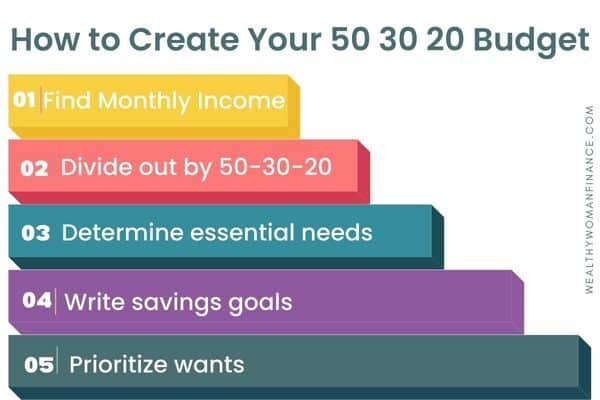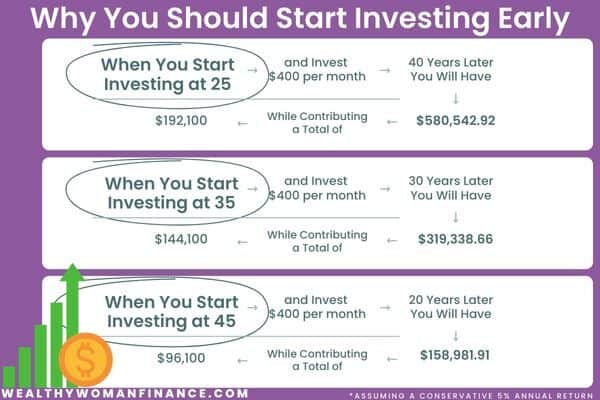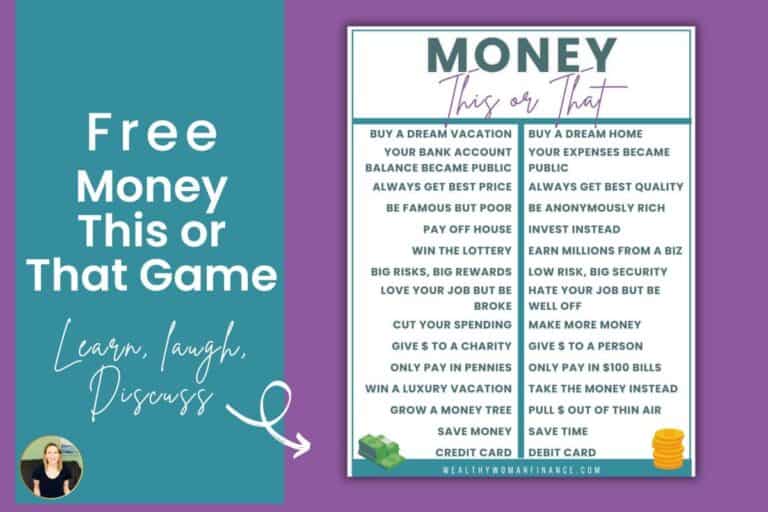Best Tips: How To Get Ahead Financially In Your 20s, 30s, 40s & Beyond

For most Americans, managing money is a struggle. It’s not that we don’t want to get ahead. It’s simply that we don’t know how, or we’re influenced by things that we don’t realize are hurting us.
That’s why today, we’re jumping into the exact steps that show you how to get ahead financially at any age. Even when you are behind. Even if you are a single parent.

You can do it! And we’re here to help!
Why Is It So Hard To Get Ahead Financially?
Before we get into each step, let’s address the elephant in the room. Why is getting ahead so difficult? Here are the two major reasons:
You Don’t Save Enough
Here’s the cold hard truth. If you’re not getting ahead financially, it’s because you’re not living well below your means. This could be an income problem or a spending problem. Either way, if you don’t address it head-on, the rest of the steps on this page won’t help you nearly as much as they could.
You Don’t Know What To Do With Your Money
No one taught you. And that’s not your fault. It’s not like it’s a subject in school, even though it should be! Luckily, you’re here. So, pat yourself on the back and keep reading. Because you’re solving this issue now!
Now, you’ll find ways to get ahead financially in each of the decades below. But you can use any of the following tips at any stage of your life.
- In Your 20s
- In Your 30s
- In Your 40s
- In Your 50s & 60s
Top Ways to Get Ahead in your 20s
1. Learn About Budgeting

In your 20s, you’re just learning how to handle money. So, the best first step is to learn how to budget and set one up for yourself. Follow the 50 30 20 budgeting template, the 60 30 10 rule or make up your own.
Set up a plan for where your money will go and how much you’ll save. This. Is. Huge.
2. Find a Financial Mentor
Next, find people in your life who are good with money. Now, that doesn’t mean they’re good at looking rich (i.e. spending money). It means they have money in the bank.
Do not take advice from someone who isn’t where you want to be.
Consider family members, friends, or even work colleagues. You’ll eventually find someone who’s done what you want to do around your finances. Then, ask questions!
3. Don’t Rack Up Debt (And Pay Off High-Interest Rates)
Debt you rack up in your 20s can follow you for decades. This means you’ll be potentially paying tens of thousands of dollars for things you could have saved up and paid cash for.
When my husband and I got married, I had one money rule. As he was chatting about the fancy car and boat he wanted, I said “look, we can buy whatever toys you want…as long as we’re waiting until we have cash for it.” He looked at me like I had three eyes, but he agreed. To this day, that was the best financial decision we made in our 20s.
“Get into the habit of asking yourself, ‘Does this support the lifestyle I’m trying to create?’”
–Unknown
4. Build Up an Emergency Fund
In your 20s, life is pretty exciting. New friends. New jobs. New love interests. But you start to learn that, well, bad stuff happens too. Sometimes you can prevent it. And sometimes you can’t.
Either way, you want to have money in the bank to take care of the bad times. Six months of your expenses is standard advice. But it’s a personal decision. Have the amount of money in a savings account that helps you sleep at night.
Try this free emergency fund challenge tracker and calculator >>
5. Put Time on Your Side For Retirement

Finally, for how to get ahead financially in your 20s, you can’t beat investing. Once you have your debt and budget under control, put the power of compound interest on your side! The chart above shows how much different your totals come out to if you invest for a long period of time.
How to Get Ahead Financially in your 30s
1. Put $ Into Your HSA
In your 30s, if you have a medical account available, it’s smart to save regularly through it. This has two spectacular benefits:
- It gives you an easy way to build a medical emergency fund (for when your kid breaks her arm or you decide to get braces as an adult).
- The money that goes in and out of an HSA is tax-free (as long as you use it for qualified medical expenses).
2. Educate Yourself
The single best thing you can do for your finances at any age is to LEARN. READ. LISTEN. OBSERVE.
Learn what others have done to succeed. How can you repeat those steps for your own success?
One amazing thing about the time we’re living in is that information is more available than ever. Listen to podcasts, peruse blogs, watch documentaries, and read books. The more you learn, the more you’ll realize that many financially successful people aren’t that special. They just know what steps to follow.
3. Make a Will
If you decide to get married and have kids in your 30s, you’ll want to make sure you put together a will. This not only protects your kids financially in a tragedy, but you’ll be making sure they’re taken care of physically and emotionally too.
4. Plan for Kids College

If you had children in your 20s and 30s, and you’d like to help them with college, you’d better be thinking about it early. Give your investment money time to build up and reap the rewards of compound interest!
Consider a 529 account as this money grows tax-free and will not be taxed when it’s taken out for college. Your own state may also offer additional tax breaks. 529 plans are generally very flexible and low maintenance. Plus, in some states, you can choose another state’s plan. (For example, we live in the state of Kansas but use a 529 in a different state).
The most important thing here is that you’re saving. Don’t procrastinate because you’re not sure whether you should do a 529 and which one.
5. Get into Dollar Cost Averaging
Now that you’re steadily investing in retirement, you’ll want to consider dollar cost averaging. What is this? It simply means putting a steady amount of money (say $400) into your investments each and every month.
Over time, this consistency lowers the impacts of volatility. It allows you to buy more shares at lower prices because you’ve taken emotion, guessing, and the cost of trying to time the market out of the game.
Best Tips to Get Ahead in your 40s

1. Consider How You’ll Help Aging Parents
Plan ahead for if your parents will need help financially. Understanding your parents’ financial situation now will eliminate any ugly surprises down the road.
2. Rebalance your Portfolio
As you invest for long periods of time, your portfolio will begin to shift. The things that have done well over the last 10-20 years overtake the rest and suddenly your investment portfolio is no longer the mix of stocks, bonds, cash, etc. that you want it to be.
This is why rebalancing in your 40s is such a great idea. Visit your online broker and check out the tools they have to analyze your portfolio. Many of them will take a look at your asset allocation for you. And they’ll give you easy-to-read charts to help you see where you’re out of whack.
3. Determine Your Path and Your Why
In the game of finance, it’s easy to get caught up in the exciting. Day trading is exciting. Flipping houses for big bucks is exciting. But where you find big wins you also find big losses.
So, determine your risk tolerance in your 40s. How much risk can you handle to make sure you sleep at night? Are you playing the fun short game or the boring long game? Or is it a mix of both?
And ask yourself your “why.” What are your financial goals and why are they so important to you? Giving yourself clear financial goals and a solid path puts you leaps and bounds ahead of most people. It’s simple but profound.
4. Create a Passive Income Stream
Building a passive income now will benefit you for years to come. Not only does it give you extra income, but it also provides the security of income if something happens to your main job.
But, what is a passive income stream?
Passive income is regular income from a source that doesn’t come from your constant participation. Note: passive income streams still require work. The work is just mostly done upfront as opposed to throughout.
Examples of passive income include:
- Rental Properties
- Book Royalties
- Affiliate Marketing
- Creating an App
- Peer-to-Peer Lending
- Creating an Online Course
- Advertising on Your Car
- Renting Out Your Home, Car, or Other Items
5. Save Your Promotions
In your 40s, your promotions begin to build on themselves. You’ll also notice friends and family expanding their lifestyles. This phenomenon is called “lifestyle creep” and if you can avoid it, you’ll be far better off.
Instead of using all of your money on new spending, save at least a portion of your promotions for the future. After all, you lived without the promotion money before and you didn’t even notice.
in your 50s & 60s
For many, kids leave the house in these years and you may have fewer family expenses. That means you can take advantage of the following:

1. Save For Weddings
If you had kids, you’re bound to run into weddings. Obviously, your own kids’ weddings will be expensive. But don’t forget about nieces, nephews, and friends’ kids if you’ll be helping with those as well.
2. Create Your Social Security Strategy
Research, learn, and educate yourself. As a rule, wait on your social security check until age 70. This gives you the best possible benefit. But, obviously, everyone’s situation is different. So, consider your health and financial situation, and then make a plan.
Side Tip: Don't depend on Social Security when you do your financial planning. Continue to invest in your retirement accounts so that you're covered.
3. Make Catch Up Retirement Contributions
If you sit on too much cash for decades, inflation will hurt. So, keep investing.
Individuals who are 50 or over by the end of 2022 can make catch-up contributions into their accounts up to $6,500. See more at irs.gov. If you’re not sure, see a financial advisor to get professional advice.
4. Map Out a Retirement Plan
Understand how you’ll need to live in retirement. And talk to your partner about retirement finances at this stage. A lot of couples aren’t always on the same page and don’t realize it.
What do you want your retirement years to look like?
5. Downsize your stuff
Get rid of things that no longer serve you well.
- Sell extra TVs and appliances you don’t use anymore that use electricity.
- Cancel your cable plans you don’t use.
- Downgrade insurance you may be paying too much for. My dad recently got a good discount on his auto insurance because he wasn’t driving as many miles.
*Don’t forget to simplify your finances too!
6. Downsize your House
If you have a big home, the upkeep might be more work than you’d like as you get older. But if you decide to downsize, you’ll pay less in utilities, insurance, repairs, maintenance, and taxes. These expenses can add up to a huge financial gain.
*More Tips For Better Financial Wellness
7. Cook At Home: Ways to Get Ahead Financially

The kids are gone and you may be eating out more. But this habit can lead to bigger health problems as well as higher expenses. Being healthier equals fewer medications and medical expenses as you grow older.
8. Get a Side Hustle
As you contemplate retirement, consider what you want to do in your golden years. Sure, you can watch tv in your home for hours on end. Or, you can get out with people and make extra money to support your lifestyle.
Consider these ideas to make $500 fast. Or the best side hustles for couples.
9. Pay Off Your Debts
Now is the time to get your financial future squared away. So, pay off your mortgage or any debts you still have. Close out those school debts you’ve kept forever. And then breathe easy in your later years.
“Your decisions from today forward will affect not only your life, but also your entire legacy.”
–Dave Ramsey (See more debt freedom quotes)
How to get ahead in life financially At Any Age
Now, what if you missed the boat in your 20s and 30s? No problem! Using the tips above at any age will get you ahead financially. You might have more work to do, but you will still get there!
More Wealth Building Posts You’ll Love…
- 52 week free saving challenge template
- Top Sinking Fund Categories – to help you save ahead
- Business Vision Board Ideas and Examples






